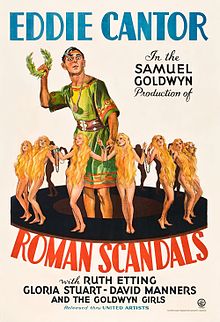fiction.wikisort.org - Movie
Roman Scandals is a 1933 American black-and-white pre-Code musical film starring Eddie Cantor, Ruth Etting, Gloria Stuart, Edward Arnold and David Manners. It was directed by Frank Tuttle. The film features a number of intricate production numbers choreographed by Busby Berkeley. The song "Keep Young and Beautiful" is from this film. In addition to the starring actors in the picture, the elaborate dance numbers are performed by the "Goldwyn Girls" (who in this film include future stars such as Lucille Ball, Paulette Goddard and Barbara Pepper). The title of the film is a pun on Roman sandals.
| Roman Scandals | |
|---|---|
 | |
| Directed by | Frank Tuttle |
| Written by | William Anthony McGuire based on the story by George Kaufman |
| Produced by | Samuel Goldwyn |
| Starring | Eddie Cantor |
| Cinematography | Ray June Gregg Toland |
| Edited by | Stuart Heisler |
| Music by | Alfred Newman |
Production company | Samuel Goldwyn Productions |
| Distributed by | United Artists |
Release date |
|
Running time | 93 minutes |
| Country | United States |
| Language | English |
| Budget | US$1,000,000 (est.) |
| Box office | $2,443,000[1] |
Plot summary
Easily the best of Eddie Cantor's gargantuan musical comedies, Roman Scandals begins in the middle-America community of West Rome, Oklahoma, where Eddie (Cantor) is employed as a delivery boy.
A self-styled authority of Ancient Roman history, Eddie bemoans the fact that the local shanty community is about to be wiped out by scheming politicians, certain that such an outrage could never have happened during Rome's Golden Days.
After a blow to the head, Eddie wakes up in Imperial Rome, where he is sold on the slave auction block to good-natured tribune Josephus (David Manners). Eddie soon discovers that the evil emperor Valerius (Edward Arnold) is every bit a crook and grafter as the politicians in West Rome, and he intends to do something about it.
He gets a job as food taster for Valerius—a none-too-secure position, inasmuch as the emperor's wife, Agrippa (Veree Teasdale), is constantly trying to poison him—and does his best to smooth the path of romance for Josephus and recently captured princess Sylvia (Gloria Stuart). Eddie's well-intentioned interference earns him a session in the torture chamber, but he escapes and commandeers a chariot.
On the verge of capture, Eddie wakes to find himself in West Rome, OK again, where he quickly foils the modern-day despots and brings about a happy ending for all his friends.
Cast list
- Eddie Cantor as Eddie/Oedipus
- The Goldwyn Girls as Slave Girls
- Ruth Etting as Olga
- Gloria Stuart as Princess Sylvia
- Edward Arnold as Emperor Valerius
- David Manners as Josephus
- Verree Teasdale as Empress Agrippa
- Alan Mowbray as Majordomo
- Jack Rutherford as Manius
- Willard Robertson as Warren Finley Cooper
- Lee Kohlmar as Storekeeper
- Harry Cording as Soldier (uncredited)
- Francis Ford as Citizen (uncredited)
- Murdock MacQuarrie as Senator (uncredited)
Soundtrack

- "Build a Little Home"
- Music by Harry Warren
- Lyrics by Al Dubin
- Performed by Eddie Cantor and chorus
- Reprised by Eddie Cantor and chorus
- "No More Love"
- Music by Harry Warren
- Lyrics by Al Dubin
- Sung by Ruth Etting
- Danced by chorus
- "Keep Young and Beautiful"
- Music by Harry Warren
- Lyrics by Al Dubin
- Performed by Eddie Cantor with chorus
- Danced by chorus
- "Put a Tax on Love"
- Music by Harry Warren
- Lyrics by Al Dubin
- Sung by Eddie Cantor
- "All of Me"
- Music by Gerald Marks
- Lyrics by Seymour Simons
- Sung by Eddie Cantor
- "Dinah"
- Music by Harry Akst
- Lyrics by Sam Lewis and Joe Young
- Sung by Eddie Cantor
- "Kickin' the Gong Around"
- Music by Harold Arlen
- Lyrics by Ted Koehler
- Sung by Eddie Cantor
- "Turkey in the Straw"
- Traditional
- Played in the opening scene
Critical response
- A written media review is located in Monthly Film Bulletin (UK), Vol. 1, Iss. 8, September 1934, (MG)
Reception
The film was one of United Artists' most popular films of the year.[2]
See also
- List of American films of 1933
References
- "WHICH CINEMA FILMS HAVE EARNED THE MOST MONEY SINCE 1914?". The Argus. Melbourne. 4 March 1944. p. 3 Supplement: The Argus Weekend magazine. Retrieved 6 August 2012 – via National Library of Australia.
- By D. W. (1934, Nov 25). "TAKING A LOOK AT THE RECORD". New York Times Retrieved from ProQuest
External links
- Roman Scandals at IMDb
На других языках
- [en] Roman Scandals
[ru] Скандал в Риме
«Скандал в Риме», в оригинале: «Римские сплетни»[комм. 1] (англ. Roman Scandals) — музыкальная комедия 1933 года, поставленная режиссёром Фрэнком Таттлом с участием популярного комика Эдди Кантора. Кантор участвовал во множестве музыкальных комедий продюсера Сэмюэла Голдвина и «Скандал в Риме» был одной из наиболее популярной из них. Сделанная с учетом массовой привлекательности, комедия в основном сквернословна и хорошо смотрится во многом благодаря очарованию Кантора[1]. Несколько замысловатых хореографических танцевальных номеров (в постановке Басби Беркли) вплетены в сюжет, предлагая перерывы в стремительных выходках Эдди Кантора. Будучи сделанным до введения Кодекса Хейса в 1934 году фильм по тем временам казался довольно смелым. Танцовщицы ревю The Goldwyn Girls в некоторых сценах снимались полностью обнажёнными, прикрытые лишь белокурыми локонами. Здесь также пародийно обыгрываются некоторые сцены из фильмов «Бен Гур» (1925, реж. Фред Нибло) — гонки на колесницах, и «Знак креста» (1932, реж. Сесил Б. ДеМилль).Другой контент может иметь иную лицензию. Перед использованием материалов сайта WikiSort.org внимательно изучите правила лицензирования конкретных элементов наполнения сайта.
WikiSort.org - проект по пересортировке и дополнению контента Википедии